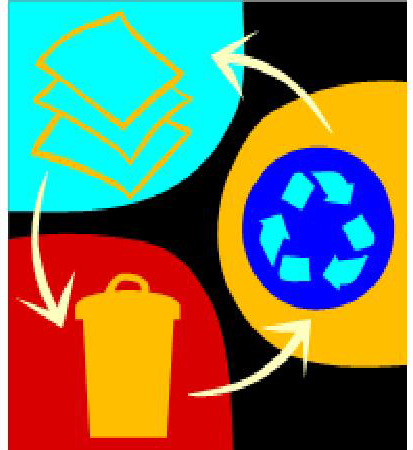We often think of recycling as the number one way to help reduce waste. But did you know it only ranks third in the hierarchy of waste minimization (reduce, reuse, recycle)? The best possible way to keep trash from a landfill is to not create trash at all. The second best way is to find a way to reuse materials instead of throwing them away. This requires putting a little thought ahead into our daily activities, and often making a shift in our thinking. Take paper, for example. Before printing a document out, the best thing to do is ask yourself, “do I REALLY need to print this?” and if the answer is no then don’t do it. But those printouts that were important at one time can then be reused as scrap paper or even bound together for a note pad. Once those notes are no longer useful, the last resort is to toss them in the recycling bin.
Here at the University there is a committee dedicated to stopping waste at its origin first and then maximizing opportunities for recycling and reuse. The University of Rochester Waste Minimization Steering Committee includes representatives from departments all around the University, including Environmental Health and Safety, Dining Services, Hazardous Waste, Purchasing, Grounds, and River Campus students, among many more.
The Committee was founded back in 1994 on the suggestion of Hazardous Waste Manager, Marvin Stillman. Its charter laid out five initiatives to help reduce waste and increase the efficiency of its disposal:
- Explore means of eliminating, reducing, or recycling waste, including hazardous, medical, food, office, and industrial wastes;
- Recommend programs that would be technically and economically feasible to achieve the goals;
- Promote, advocate, and educate the University community to minimize waste generation;
- Keep informed of government mandated waste regulations; and
- Report annually on the progress made to achieve the goals.
Since its creation, the Committee has helped to shape the way we look at waste handling at the University and beyond. Committee members and Strong Memorial Hospital (SMH) leadership worked with the EPA and the Monroe County Health Department in the effort to make medicine “mercury-free”. Our own hospital experts helped to identify mercury-free substitutes for equipment and chemical processes for which mercury use was the standard at that time. SMH became a pioneer to help make this practice the standard for most hospitals today.
The Committee has served as a forum for various departments to explore ways to reduce waste. One example of a program put on by the Committee is the annual electronics roundup, where members of the University community are encouraged to bring their unwanted computer equipment from home so that it can be recycled. The program has been a great success and in the three years that it has been running nearly 85,000 pounds of electronics have been collected.
The Committee has also served as forum for the greater community to explore waste reduction. Members worked with the NYSDEC and the EPA to host and help present seminars held at SMH for other facilities and interested persons in the region to discuss waste reduction techniques used at UR. Practices highlighted in the seminars included: Integrated Pest Management, including environmental considerations a part of the value analysis process when selecting products/processes, compliance with environmental regulations, and identification of what the obligations are as well as how to organize and track compliance monitoring efforts.
Since it was founded, the Committee has evolved a bit. With President Seligman putting a spotlight on sustainability and creating the Council on Sustainability, many of the types of recommendations that the group makes have become more commonplace. Since the hiring of Recycling Coordinator, Amy Kadrie, it is no longer the Committee’s responsibility to handle all of the University’s recycling. This has allowed for the tasks of the committee to become more focused.
The Committee serves as a means to open the lines of communications between departments to create awareness of the efforts that each department is making. More recently there has been an emphasis on spreading the word of these efforts to the greater University community, by publishing biweekly Go Green articles, like this one, as well as the creation of a sustainability focused blog, The Green Dandelion, and a Facebook fanpage called UR Sustainable.
Committee meetings are open to members of the University community, and active participants are welcome to attend. If your department or group is not represented in the committee and you would like it to be, please call the Hazardous Waste Management Unit at 275-2056 to find out when the next quarterly meeting is scheduled.
And remember, the best way to reduce waste is to not create it in the first place, so please think before you throw!


Recyclable materials tubs were made more useful and distinctive, all that is followed by raising awareness and increase in recycling. Thanks everyone for participation!
Reducing waste on the source, you’re straightforwardly sparing your organization cash by evading waste accumulation transportation and transfer costs and diminishing your expenses through diminished contamination control, obligation, and administrative consistency costs.
The policy and process to have the waste minimization means to reduce the production of waste at society and individual level. Thanks for the post.
Would be quite interesting to see other opinions regarding this.
Please add cellphones recycling to yours and any movement and bring attention to this issue. Cellphones are such a waste currently not only for the United States but other nations where the cell phone penetration is large but do not have the recycling capabilities. Cellphones and their electronic boards, capacitors and chips contains some minerals extracted exclusively from countries in war like Congo and our dependency fuels abuses in human rights and dictatorships in such countries. Thanks for your post and the opportunity to bring attention to this subject.